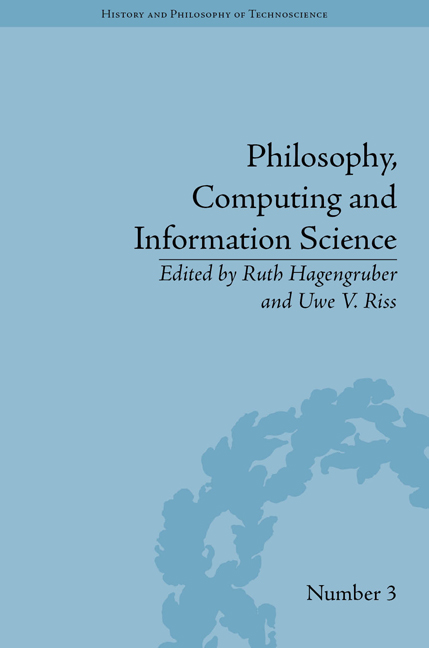Book contents
- Frontmatter
- CONTENTS
- List of Contributors
- List of Figures and Tables
- Introduction: Philosophy's Relevance in Computing and Information Science
- Part I Philosophy of Computing and Information
- Part II Complexity and System Theory
- Part III Ontology
- Part IV Knowledge Representation
- Part V Action Theory
- Part VI Info-Computationalism
- Part VII Ethics
- Notes
- Index
Introduction: Philosophy's Relevance in Computing and Information Science
- Frontmatter
- CONTENTS
- List of Contributors
- List of Figures and Tables
- Introduction: Philosophy's Relevance in Computing and Information Science
- Part I Philosophy of Computing and Information
- Part II Complexity and System Theory
- Part III Ontology
- Part IV Knowledge Representation
- Part V Action Theory
- Part VI Info-Computationalism
- Part VII Ethics
- Notes
- Index
Summary
I
The relevance of computer and information science for today's life is obvious, whereas it seems to be less obvious whether this also holds for the philosophy in this field. The velocity of technological development has left no space for questions that concern the foundations of information and computation. However, a closer look reveals that computer and information science are thoroughly steeped in philosophical assumptions, even though this fact rarely stands out in public awareness. It only comes to the fore when technical developments slow down or miss our expectations. Nevertheless, the awareness is growing that it might be time to establish an exchange between the technical and philosophical disciplines. The main difficulty that we have to overcome in starting this process consists in the historical misunderstandings and mutual distrust on both sides that have often disturbed the dialogue.
While nobody seriously doubts that there are social and historical dependencies between technology and science, the philosophical impact on science and technology is often disputed or even completely denied. In fact, the genuine philosophical procedures of analysis and synthesis play an eminent role in science and technology. Definitions, rules and laws, by which scientific functionality and the realm of its applicability is determined, clearly prove philosophy's impact in this respect.
- Type
- Chapter
- Information
- Philosophy, Computing and Information Science , pp. 1 - 18Publisher: Pickering & ChattoFirst published in: 2014



